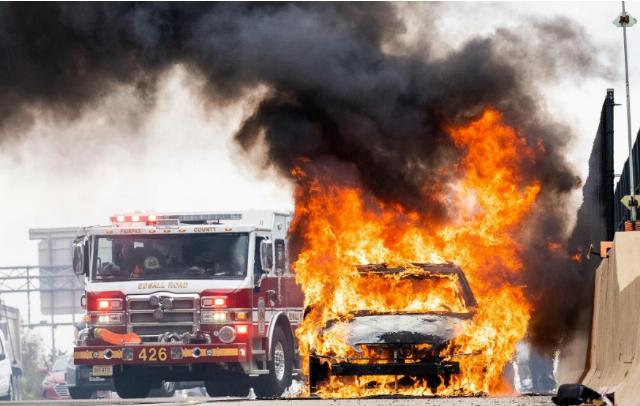by Chris Talgo
All is not well for the Electric Vehicle (EV) industry these days. More
Suffice to say, all is not well for the Electric Vehicle (EV) industry these days. Despite ample subsidies from the federal government, EV sales are slumping.
Some of the largest automakers, such as Mercedes Benz, admit they won’t come close to hitting their EV sales estimates over the next few years. And Tesla, the king of EVs, just announced its lowest quarterly profit over the past two years. After the Tesla news broke, the company’s shares cratered, leading to a $138 billion decline in value.
Even worse, Hyundai Motor North America is facing a lawsuit that contends the auto manufacturer “has emphasized sales-volume growth in its Hyundai branded EVs, leading the public to believe these increasing EV sales are occurring organically because of the desirability of Hyundai EVs and customer demand for these vehicles.”
What’s more, the lawsuit, filed by Napleton Aurora Imports, a dealership based in the Chicago suburbs, alleges Hyundai pressured dealerships to “artificially inflate” EV sales numbers; created a perverse incentive system in which dealerships that “played ball” were rewarded while those who did not were “punished,” issued several press releases trumpeting “fake” EV sales figures, “created a multitiered scheme to cause its dealers to report false [EV] sales,” and deliberately pushed a “false narrative” that its EV sales were due to “organic growth fueled by desirable vehicles and consumer demand.”
Aside from the lackluster sales figures and alleged scams, the EV industry is facing several vexing problems that seem almost insurmountable at this point in time.
For instance, over this summer alone, there have been numerous reports of people being trapped inside EVs due to dead batteries. In some of these cases, toddlers have been locked inside of sweltering cars.
In one example, on June 20, Renee Sanchez was eager to take her two-year-old granddaughter to the Phoenix Zoo. Early that morning, Sanchez strapped the toddler into the backseat of her Model Y Tesla. After closing the rear door, Sanchez attempted to open the front door. However, it would not open because the battery was dead.
 “I
could not get in. My phone key wouldn’t open it. My card key wouldn’t
open it,” Sanchez told a local news network. In a panic, Sanchez called
911. Within minutes, thankfully, the fire department showed up.
“I
could not get in. My phone key wouldn’t open it. My card key wouldn’t
open it,” Sanchez told a local news network. In a panic, Sanchez called
911. Within minutes, thankfully, the fire department showed up.
“The first thing they said was, ‘Uggh, it’s a Tesla. We can’t get in these cars,’” Sanchez said. “And I said, ‘I don’t care if you have to cut my car in half. Just get her out.’”
Fortunately, the firefighters used an ax to break the back window. Then, they climbed in and unstrapped the toddler, literally saving her life.
Although the toddler was okay, Sanchez said they both were traumatized by the incident. After her granddaughter was rescued, Sanchez couldn’t help but think, “oh my God, this could have been so much worse.” She was angry. And rightfully so.
“When [the Tesla] works, it’s great. But when it doesn’t, it can be deadly,” she warned.
Make no mistake, this is not the first time someone has been trapped inside an EV. Nor will it be the last.
Another major concern for EV owners is the possibility of chargers catching fire. Consider what recently happened to NFL star receiver Randall Cobb, whose home burned down after the Tesla charger in his garage caught on fire.
“The Tesla charger caught on fire in the garage late last night and quickly spread. We got out of the house with nothing but the clothes on our back and no shoes on our feet,” Cobb’s wife, Aiyda, posted to Instagram. “We are lucky to be alive,” she added.
According to Cobb, “We got out of the house and I was able to go back in and get our dog, Louie. We can’t thank Chief Caruthers, Captain Irvin, and the Nashville Fire Department enough for their swift action.”
“I can’t get the image of the brave firefighter getting into position out of my head; he didn’t even have water to shoot yet,” Cobb continued. “I truly thought the cars were going to explode and that we would lose him to this tragedy. He is a true hero.”
Cobb is right. EV fires are extraordinarily dangerous.
As the National Transportation Safety Board notes, “Fires in electric vehicles powered by high-voltage lithium-ion batteries pose the risk of electric shock to emergency responders from exposure to the high-voltage components of a damaged lithium-ion battery. A further risk is that damaged cells in the battery can experience uncontrolled increases in temperature and pressure (thermal runaway), which can lead to hazards such as battery reignition/fire. The risks of electric shock and battery reignition/fire arise from the "stranded" energy that remains in a damaged battery.”
In fact, EV fires are so dangerous that fire departments cannot use regular equipment to fight them.
Of course, the EV charger-sparked fire that destroyed the Cobbs’ home is far from the first this has happened. Over the past few years, similar incidents have occurred throughout the country. Sadly, scores have died from these nightmares. And, in all likelihood, more will.
As they say, you only have one chance to make a first impression. And, based on Americans’ reluctance to purchase EVs, I think it’s safe to say at this point that the EV rollout has been a disaster so far.
Image: Pexels/Stuyves Exantus
Chris Talgo (ctalgo@heartland.org) is editorial director at The Heartland Institute.
Source: https://www.americanthinker.com/articles/2024/07/more_bad_news_on_the_electric_vehicle_front.html
No comments:
Post a Comment